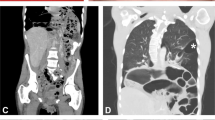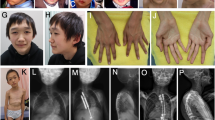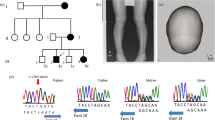Abstract
Ehlers–Danlos syndrome (EDS) is characterized by joint hypermobility, alterations in the skin and additional signs of connective tissue involvement. EDS type VI was the first connective tissue disorder for which a specific defect in collagen metabolism was identified, namely a deficiency of lysyl hydroxylase activity. We now report a homozygous single basepair substitution converting the CGA codon (Arg319) to a TGA termination codon in two siblings with EDS type VI. The healthy parents, who are first cousins, and two of the three healthy siblings of the patients are heterozygous. The mutation leads to an almost complete absence of lysyl hydroxylase activity in extracts derived from fibroblasts of the patients.
This is a preview of subscription content, access via your institution
Access options
Subscribe to this journal
Receive 12 print issues and online access
$209.00 per year
only $17.42 per issue
Buy this article
- Purchase on Springer Link
- Instant access to full article PDF
Prices may be subject to local taxes which are calculated during checkout
Similar content being viewed by others
References
McKusick, V.A. Heritable Disorders of Connective Tissue (Mosby, St. Louis, 1972).
Krane, S.M. Genetic and acquired disorders of collagen deposition. In Extracellular Matrix Biochemistry (eds Piez, K.A. & Reddi, A.H.) 413–463 (Elsevier, New York, 1984).
Prockop, D.J. & Kivirikko, K.I. Heritable diseases of collagen. New Engl. J. Med. 311, 376–386 (1984).
Kivirikko, K.I. & Kuivaniemi, H. Posttranslational modifications of collagen and their alterations in heritable diseases. In Connective Tissue Disease: Molecular Pathology of the Extracellular Matrix (eds Uitto, J. & Perejda, A.J.) 263–292 (Marcel Dekker, New York, 1987).
Byers, P.H. Disorders of collagen biosynthesis and structure. In The Metabolic Basis of Inherited Disease (eds Scriver, C.R., Beaudet, A.L., Sly, W.S. & Valle, D.) 2805–2842 (McGraw-Hill, New York, 1989).
Steinmann, B., Royce, P.M. & Superti-Furga, A. The Ehlers-Danlos syndrome. In Connective Tissue and Its Heritable Disorders: Molecular, Genetic and Medical Aspects (eds Royce, P.M. & Steinmann, B.) 351–408 (Wiley-Liss, New York, 1992).
Pinnell, S.R., Krane, S.M., Kenzora, J.E. & Glimcher, M.J. A heritable disorder of connective tissue: hydroxylysine-deficient collagen disease. New Engl. J. Med. 286, 1013–1020 (1972).
Krane, S.M., Pinnell, S.R. & Erbe, R.W. Lysyl-protocollagen hydroxylase deficiency in fibroblasts from siblings with hydroxylysine-deficient collagen. Proc. natn. Acad. Sci. U.S.A. 69, 2899–2903 (1972).
Wenstrup, R.J., Murad, S. & Pinnell, S.R. Ehlers-Danlos syndrome type VI: Clinical manifestations of collagen lysyl hydroxylase deficiency. J. Pediatr. 115, 405–409 (1989).
Sussman, M., Lichtenstein, J.R., Nigra, T.B., Martin, G.R. & McKusick, V.A. Hydroxylysine-deficient skin collagen in a patient with a form of the Ehlers-Danlos syndrome. J. Bone Joint Surg. 56-A, 1228–1234 (1974).
Elsas, L.J., Miller, R.L. & Pinnell, S.R. Inherited human collagen lysyl hydroxylase deficiency - ascorbic acid response. J. Pediatr. 92, 378–384 (1978).
Krieg, T., Feldmann, U., Kessler, W. & Müller, P.K. Biochemical characteristics of Ehlers-Danlos syndrome type VI in a family with one affected infant. Hum. Genet. 46, 41–49 (1979).
Krane, S.M. Genetic diseases of collagen. In Gene Families of Collagen and Other Proteins (eds Prockop, D.J. & Champe, P.C.) 57–69 (Elsevier, New York, 1980).
Ihme, A. et al. Biochemical characterization of variants of the Ehlers-Danlos syndrome type VI. Eur. J. clin. Invest. 13, 357–362 (1983).
Dembure, P.P., Priest, J.H., Snoddy, S.C. & Elsas, L.J. Genotyping and prenatal assessment of collagen lysyl hydroxylase deficiency in a family with Ehlers-Danlos syndrome type VI. Am. J. hum. Genet. 36, 783–790 (1984).
Judisch, G.F., Waziri, M. & Kramcher, J.H. Occular Ehlers-Danlos syndrome with normal lysyl hydroxylase activity. Arch. Ophthalmol. 94, 1489–1491 (1976).
Royce, P.M., Moser, U. & Steinmann, B. Ehlers-Danlos syndrome type VI with normal lysyl hydroxylase activity cannot be explained by a defect in cellular uptake of ascorbic acid. Matrix 9, 147–149 (1989).
Kivirikko, K.I. & Myllylä, R. Post-translational processing of procollagens. Ann. N. Y. Acad. Sci. 460, 187–201 (1985).
Kivirikko, K.I., Myllylä, R. & Pihlajaniemi, T. Hydroxylation of proline and lysine residues in collagens and other animal and plant proteins. In Focus on Post-Translational Modifications of Proteins (eds Harding, J.J. & Crabbe, M.J.C.) 1–51 (CRC Press, Boca Raton, 1992).
Myllylä, R. et al. Molecular cloning of chick lysyl hydroxylase. Little homology in primary structure to the two types of subunits of prolyl 4-hydroxylase. J. biol. Chem. 266, 2805–2810 (1991).
Hautala, T. et al. Cloning of human lysyl hydroxylase. Complete cDNA-derived amino acid sequence and assignment of the gene (PLOD) to chromosome 1p36.2p36.3. Genomics 13, 62–69 (1992).
Kivirikko, K.I. & Myllylä, R. Posttranslational enzymes in the biosynthesis of collagen: Intracellular enzymes. Meth. Enzymol. 82, 245–304 (1982).
Hautala, T., Heikkinen, J., Kivirikko, K.I. & Myllylä, R. Minoxidil specifically decreases the expression of lysine hydroxylase in cultured human skin fibroblasts. Biochem. J. 284, 51–54 (1992).
Krane, S.M. Hydroxylysine-deficient collagen disease: a form of Ehlers-Danlos syndrome type VI. In American Academy of Orthopaedic Surgeons Symposium on Heritable Disorders of Connective Tissue (eds Akeson, W.H., Bornstein, P. & Glimcher, M.J.) 61–75 (Mosby, St Louis, 1982).
Myllylä, R., Günzler, V., Kivirikko, K.I. & Kaska, D.D. Modification of lysyl hydroxylase and vertebrate and algal prolyl 4-hydroxylase by diethyl pyrocarbonate defines histidine residues of importance for catalytic acticity. Biochem. J. 286, 923–927 (1992).
Sambrook, J., Fritsch, E.F. & Maniatis, T. Molecular Cloning: A Laboratory Manual (Cold Spring Harbor Press, New York, 1989).
Sanger, F., Nicklen, S. & Coulson, A.R. DNA sequencing with chain-terminating inhibitors. Proc. natn. Acad. Sci. U.S.A. 74, 5463–5467 (1977).
Casanova, J.L., Pannetier, C., Jaulin, C. & Kourilsky, P. Optimal conditions for directly sequencing double-stranded PCR products with sequenase. Nucl. Acids Res. 18, 4028 (1990).
Author information
Authors and Affiliations
Rights and permissions
About this article
Cite this article
Hyland, J., Ala-Kokko, L., Royce, P. et al. A homozygous stop codon in the lysyl hydroxylase gene in two siblings with Ehlers–Danlos syndrome type VI. Nat Genet 2, 228–231 (1992). https://doi.org/10.1038/ng1192-228
Received:
Accepted:
Issue Date:
DOI: https://doi.org/10.1038/ng1192-228
This article is cited by
-
Comparative genomic and biochemical analyses identify a collagen galactosylhydroxylysyl glucosyltransferase from Acanthamoeba polyphaga mimivirus
Scientific Reports (2022)
-
A collagen glucosyltransferase drives lung adenocarcinoma progression in mice
Communications Biology (2021)
-
The first case report of Kyphoscoliotic Ehlers-Danlos syndrome of chinese origin with a novel PLOD1 gene mutation
BMC Medical Genetics (2020)
-
Kyphoscoliotic type of Ehlers-Danlos Syndrome (EDS VIA) in six Egyptian patients presenting with a homogeneous clinical phenotype
European Journal of Pediatrics (2015)
-
Recombinant expression of hydroxylated human collagen in Escherichia coli
Applied Microbiology and Biotechnology (2014)



